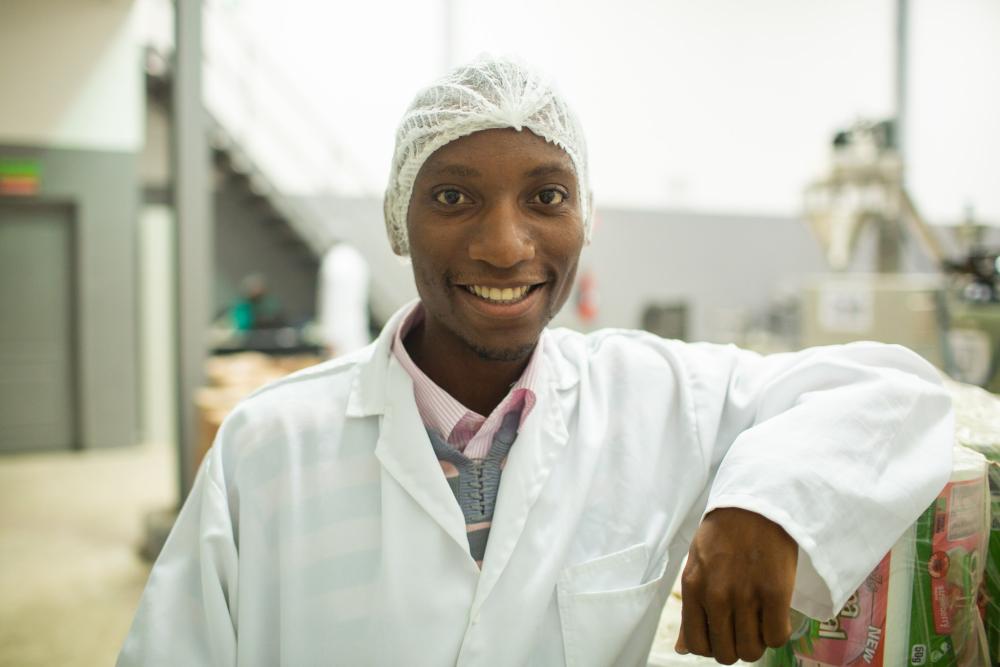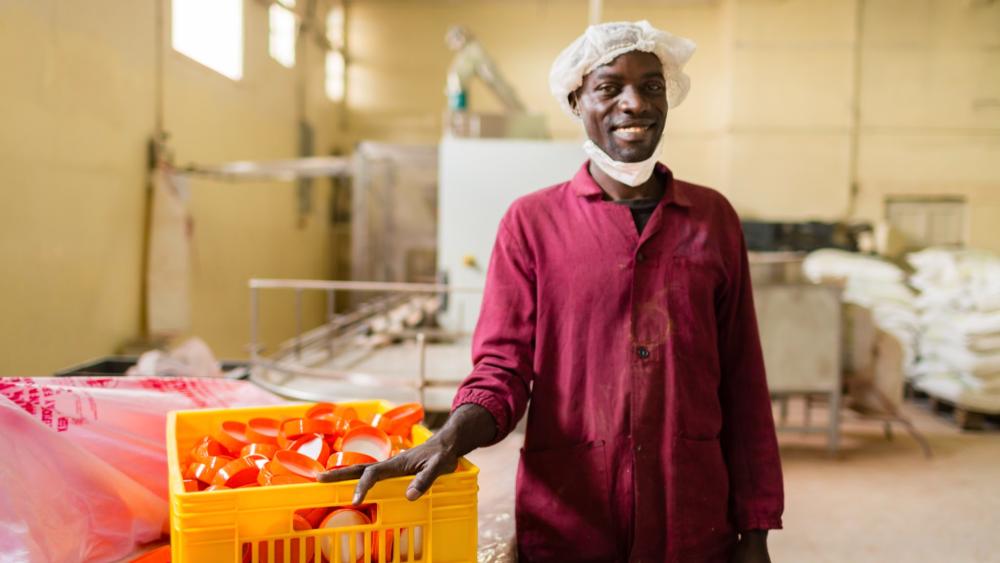
Management Trainees Help Bring PFS Alumni Apprenticeship Program to Life
In an effort to address technical challenges at food processing companies in Africa, PFS developed an apprentice program that could help improve food security and give recent graduates professional work experience. Over the years, this program has grown to over 100 apprentices across seven African countries. To further promote. networking and resource sharing between apprentices, PFS needed advice on how to design an effective alumni network. With the help of six management trainees from Bühler, PFS was able to develop the program in 2021 and give recently graduated apprentices an opportunity to stay connected. The volunteers provided key insights into successful alumni programs and shared suggestions on engagement strategies such as communication platforms, content, and more.

Mentorship that Matters
Even at the highest level, mentorship matters. From apprentices to CEOs, mentoring can make a huge difference in an individual, and company’s, trajectory. Over the past year, Bühler President and CEO of North America Andy Sharpe has been mentoring PFS client Managing Director Miraj Shah. Miraj runs Crofts Limited in Kenya, one of the largest avocado oil producers in Africa. “The mentorship has been great,” said Andy. “We’ve had plenty of great discussions from culture to business growth.” The PFS Mentorship Program is a great opportunity to connect with food industry leaders one on one and support African entrepreneurs. To date, the PFS Mentorship Program has connected over 150 individuals and supported both mentors and mentees in reaching their personal and professional goals.

Virtual Volunteerism is an Inclusive Solution to Strengthen Community and Company Resilience
There are an estimated one billion volunteers in the world. They play a crucial role in building resilient communities and helping those in need. However, the COVID-19 pandemic has had a significant impact in bringing that number down. For workplace volunteering programs, it’s no surprise that in-person volunteerism dropped as social distancing requirements and remote work began almost overnight.
Virtual volunteerism is a great way to continue and even grow a culture of giving back, despite in-person limitations. Our organization, Partners in Food Solutions (PFS), is a consortium of seven world-class companies – General Mills, Cargill, DSM, Bühler, The Hershey Company, Ardent Mills, and J.M. Smucker -who have been supporting remote volunteering for 13 years,. Employees of our consortium partners share their expertise remotely with entrepreneurial food companies in Africa to help strengthen their businesses and improve local food security. Over the years, we’ve learned to overcome challenges around technology, how to engage a remote workforce, and more. In 2021, we supported 616 volunteers, accounting for over 17,000 volunteer hours. Each one of these volunteers represents a positive impact on a client, a community, a country and a continent. The passion for food security, commitment to help, and know-how that is shared is truly treasured by the clients we serve.
The Personal Case for Virtual Volunteering
Take for example Natalia Faiden and Tomomi Fujimaru, food safety and quality professionals from General Mills. They stepped up and volunteered to share their knowledge with Forest Fruits, one of the leading producers of organic honey and beeswax in Lusaka, Zambia. Forest Fruits sources honey from over 7000 traditional beekeepers that utilize sustainable farming practices.
Forest Fruits wanted to become HACCP certified (an international standard defining the requirements for effective control of food safety) but had challenges passing their previous certification audit due to lack of in-house expertise. Natalia and Tomomi volunteered their expertise and time with Forest Fruits to achieve certification. “Volunteering enables me to take advantage of the resources and knowledge at General Mills to support and develop the food industry where it is most needed, while getting to know other cultures and learning from them, “ said Natalia. “Without a doubt, my favorite part of this project was seeing Forest Fruit’s transformation and helping them receive the certification.” That certification will help the company grow, maintain high quality and safety standards, and expand their market reach.
The Business Case for Virtual Volunteering
Both employers and employees benefit from supporting a culture that facilitates volunteerism and meaningful connection. In addition to the high personal satisfaction that comes with volunteering, 68 percent of PFS volunteers surveyed said that they have gained new or improved skills through volunteering with us. Additional research also reinforces the importance of employee practices like volunteerism that “goes beyond company walls.” According to research these organizations are 2.2 times more likely to exceed financial targets, 2.8 times more likely to adapt well to change and more than three times more likely to retain employees and reduce absenteeism and health insurance claims.
The Secrets to a Successful Program
Keys to a successful knowledge-transfer volunteering program like ours includes a place where the specific expertise of your employees is needed and designing a program that has specifically designed projects that volunteers and clients can engage in virtually. At PFS we only work on projects that a client asks for and prioritizes. In effect, they “pull” the expertise from us, we don’t “push” them into prescribed generic solutions. Additionally, engagements should be clearly structured from the beginning using well-scoped project charters that include transparent and realistic timelines, objectives, and deliverables. We spend time setting expectations with our volunteers so they are prepared to address these unique challenges in resource constrained environments.
We’re happy to share additional insights on volunteering, including our findings on implementing successful remote volunteering programs. Please see our resource: Building a Skills Based Remote Volunteering Program.
____
Partners in Food Solutions, a consortium of leading global food companies – General Mills, Cargill, Royal DSM, Bühler, The Hershey Company, Ardent Mills and The J.M. Smucker Company – is working to strengthen food security, improve nutrition and increase economic development across Africa by expanding and increasing the competitiveness of the food processing sector. We link corporate volunteers from our world-class corporate partners, who share their expertise with promising entrepreneurs in eleven African countries.

Helping Long-term Client Embrace Frugal Innovation
Faffa Foods, a fortified maize flour company, wants to play a leading role in tackling malnutrition in Ethiopia. Known for their nutritious baby food products, Faffa Foods wanted to expand their product portfolio and provide more nutritious products to their community and beyond. Dealing with limited resources, further exacerbated by the pandemic, Faffa Foods turned to PFS and TechnoServe for technical assistance. Tasked with developing an enriched snack bar were General Mills volunteers Jeff Enz and Moses Khamis. Jeff, a R&D veteran with over 25 years of experience at General Mills, and Moses, a senior extrusion engineer from Uganda who joined the company earlier this year, were the perfect fit for the job.
“I love food science and really like sharing my passion and knowledge with others,” said Jeff. “It is fun to support young companies in emerging marketing with new food offerings and technology.” Jeff and Moses were able to share their ingredient knowledge, experimental design experience, and processing expertise to advise Faffa Foods on the development of their new grain-based snack bar. “It was interesting to learn about the different challenges companies like Faffa Foods face in regards to innovation,” said Moses. “They are constrained by numerous challenges but with the right mindset can come up with unique products and solutions.”
After months of research and fine tuning the formulation for the snack bar, Faffa Foods is now ready to enter the trial phase of the project. Jeff and Moses have both agreed to continue supporting Faffa Foods through their trials and will spend the next several months running production trials, developing production procedures, and troubleshooting any issues. “It has been a pleasure working with PFS volunteers and TechnoServe,” said Faffa Foods Deputy Director Zelalem Yimer. “We really appreciate Jeff and Moses’ commitment, which is a driving force for our team. We can’t wait to share an update on the status of our product in the near future!”

Entrepreneur Brings Opportunity to Small-scale Farmers in Zambia
For the past 18 years, Community Markets for Conservation (COMACO) has been leading the way in conversation across Zambia. “COMACO originally formed to provide economic opportunities for poachers in the area so they didn’t have to rely on poaching for an income,” said COMACO CEO Dale Lewis. “We now engage small-scale farmers, most with one to two acres of farmland, who care for the soil and environment.” Dale approaches his business by seeing what farmers are producing in the local community and working with them to add value to their crops. COMACO originally started with rice because it was a crop that was being grown in the communities where wildlife lived. Since then, COMACO has added several legume products to their portfolio not only because they’re popular in the community and healthy, they also help bring valuable nutrients back to the soil.
Most recently, Dale noticed that farmers in his community were sitting on crates and crates of tomatoes and the idea of producing ketchup occurred to him. “During the dry season women produce a lot of tomatoes,” said Dale. “I instantly saw an opportunity to help them make more money by adding value to their tomatoes and processing them into organic ketchup.” Despite having little knowledge in tomato processing, Dale knew this would bring a lot of needed opportunity to the area so he reached out to PFS and their volunteer network for advice.
PFS engaged Kurt Villwock, a principal scientist at General Mills with tomato processing experience, to help with the request. “I was first introduced to PFS by my leadership team at General Mills who realized I may be a good match to help solve a problem,” said Kurt. “I’ve worked in the food and beverage industry for over 20 years and have a PhD in Food Science. I wanted to use my skills and expertise to help others.” In order to start processing tomatoes at their new facility in the Zambian capital, Lusaka, COMACO needed advice on what the processing would look like, estimate cost for small-scale production, and equipment recommendations. After a few one-hour calls and robust discussion, COMACO received a detailed guidance document from Kurt that would help them get started with a small-scale organic tomato processing plant.
“This is some of the clearest and most helpful instructions on food processing we’ve had yet,” said Dale. “We had received a quote from an equipment vendor and Kurt pointed out that the processing line we were looking at would not be able to retain the color of the ketchup or provide a usable by-product.” Utilizing the guidance document, COMACO is working with local equipment vendors to source appropriate equipment for their future plant. Additionally, Dale is working on raising the necessary capital to help COMACO achieve their vision of opening the new tomato processing plant. “We wish we could have Kurt here in Zambia helping us make COMACO the next General Mills in Africa,” said Dale. “We had a vision of being a brand for Africa and General Mills and PFS have helped make that possible.”
In September 2021, COMACO was awarded a $600,000 grant from the Enterprise Challenge Fund to finance a tomato production plant that will provide additional income to more than 20,000 farmers in Zambia.